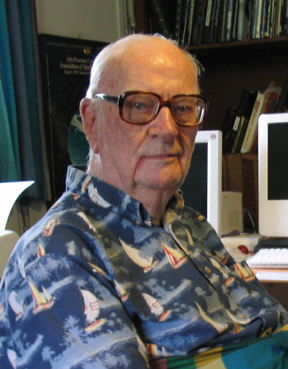Arthur C. Clarke frasi celebri
“Ogni tecnologia sufficientemente avanzata è indistinguibile dalla magia.”
da Profiles of the Future, Harper & Row, 1958
Origine: Citato anche in 3001: Odissea finale e in R. Kelly, The Box.
premessa
2001: Odissea nello spazio
Arthur C. Clarke Frasi e Citazioni
“Inoltre, avevano fatto il primo passo verso un'amicizia genuina. Si erano scambiati vulnerabilità.”
Arthur C. Clarke: Frasi in inglese
Breaking Strain, p. 184
2000s and posthumous publications, The Collected Stories of Arthur C. Clarke (2001)
Guardian Angel, p. 220
2000s and posthumous publications, The Collected Stories of Arthur C. Clarke (2001)
The Road to the Sea, p. 265
2000s and posthumous publications, The Collected Stories of Arthur C. Clarke (2001)
The Road to the Sea, p. 269
2000s and posthumous publications, The Collected Stories of Arthur C. Clarke (2001)
The Road to the Sea, p. 284
2000s and posthumous publications, The Collected Stories of Arthur C. Clarke (2001)
“It was good to be alive; it was better to be young; it was best of all to be in love.”
The Road to the Sea, p. 284
2000s and posthumous publications, The Collected Stories of Arthur C. Clarke (2001)
The Road to the Sea, p. 292
2000s and posthumous publications, The Collected Stories of Arthur C. Clarke (2001)
The Road to the Sea, p. 294
2000s and posthumous publications, The Collected Stories of Arthur C. Clarke (2001)
Patent Pending, p. 500
2000s and posthumous publications, The Collected Stories of Arthur C. Clarke (2001)
Patent Pending, p. 508
2000s and posthumous publications, The Collected Stories of Arthur C. Clarke (2001)
“For what is life but organized energy?”
Out of the Sun, p. 656
2000s and posthumous publications, The Collected Stories of Arthur C. Clarke (2001)
“This sounded promising, and my coefficient of cupidity jumped several points.”
I Remember Babylon, p. 705
2000s and posthumous publications, The Collected Stories of Arthur C. Clarke (2001)
Death and the Senator, p. 744
2000s and posthumous publications, The Collected Stories of Arthur C. Clarke (2001)
Dog Star, p. 786
2000s and posthumous publications, The Collected Stories of Arthur C. Clarke (2001)
“The idea of death was utterly incongruous—as it is to all men until the final second.”
Maelstrom II, p. 789
2000s and posthumous publications, The Collected Stories of Arthur C. Clarke (2001)
An Ape About the House, p. 802
2000s and posthumous publications, The Collected Stories of Arthur C. Clarke (2001)
In both cases the cure is simple though usually very expensive.
"Appendix II: MITE for Morons," The Odyssey File (1984), p. 123
1960s, Clarke's Three Laws, et al (1962; 1973…)
But it is amazing how childishly gullible humans are. There are, for example, so many different religions — each of them claiming to have the truth, each saying that their truths are clearly superior to the truths of others — how can someone possibly take any of them seriously? I mean, that's insane. ...Though I sometimes call myself a crypto-Buddhist, Buddhism is not a religion. Of those around at the moment, Islam is the only one that has any appeal to me. But, of course, Islam has been tainted by other influences. The Muslims are behaving like Christians, I'm afraid.
"God, Science, and Delusion: A Chat With Arthur C. Clarke" Free Inquiry magazine, Volume 19, Number 2 (Spring 1999) http://www.secularhumanism.org/index.php?section=library&page=clarke_19_2
2000s and attributed from posthumous publications
2000s and posthumous publications, 90th Birthday Reflections (2007)
2000s and posthumous publications, 90th Birthday Reflections (2007)
“The false logic involved is: “We exist; therefore something—call it X—created us.””
Once this assumption is made, the properties of the hypothetical X can be fantasied in an unlimited number of ways.
But the entire process is obviously fallacious; for by the same logic something must have created X—and so on. We are immediately involved in an infinite regress, which can have no meaning in the real universe.
Crusade, p. 878
2000s and posthumous publications, The Collected Stories of Arthur C. Clarke (2001)
“There may be a moral here. For the life of me I can’t find it.”
Origine: 2000s and posthumous publications, The Collected Stories of Arthur C. Clarke (2001), What Goes Up, p. 529
“History, it has been said, never repeats itself but historical situations recur.”
Earthlight, p. 347
2000s and posthumous publications, The Collected Stories of Arthur C. Clarke (2001)
The Road to the Sea, p. 298
2000s and posthumous publications, The Collected Stories of Arthur C. Clarke (2001)
The Road to the Sea, p. 298
2000s and posthumous publications, The Collected Stories of Arthur C. Clarke (2001)
“I doubt if such a word exists, and if it does, it shouldn’t.”
Silence Please, p. 247
2000s and posthumous publications, The Collected Stories of Arthur C. Clarke (2001)
“It is surprising how long it takes to do a simple addition when your life depends on the answer.”
Breaking Strain, p. 172
2000s and posthumous publications, The Collected Stories of Arthur C. Clarke (2001)
“Why should one be afraid of something merely because it is strange?”
The Wall of Darkness, p. 114
2000s and posthumous publications, The Collected Stories of Arthur C. Clarke (2001)
"Meeting of the Minds : Buzz Aldrin Visits Arthur C. Clarke" by Andrew Chaikin (27 February 2001) http://web.archive.org/web/20010302082528/http://www.space.com/peopleinterviews/aldrin_clarke_010227.html
2000s and posthumous publications
"The Sentinel" (1948), originally titled "Sentinel of Eternity" this is the short story which later provided the fundamental ideas for 2001: A Space Odyssey (1968) written by Clarke and Stanley Kubrick. Full text in 10 Story Fantasy, Vol. 1, No. 1 (Spring 1951), p. 41 https://archive.org/details/10_Story_Fantasy_v01n01_1951-Spring_Tawrast-EXciter/page/n39. Two versions of the next to the last sentence have been widely published since at least 1951, the other being: "If you will pardon so commonplace a simile, we have set off the fire alarm and have nothing to do but to wait."
1940s
